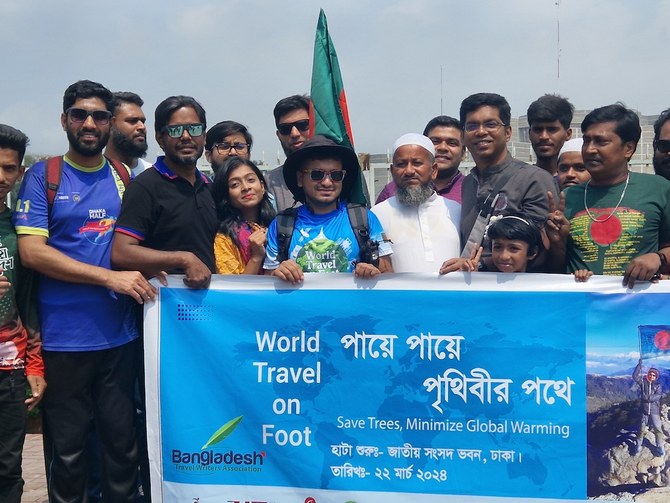DHAKA: Saiful Islam Shanto started his adventure with hiking and long-distance trails when he was still in school, exploring on foot all the sites he could reach in his native Cumilla in eastern Bangladesh.
Over a decade and thousands of kilometers later, the passion grew stronger, culminating with the beginning of his solitary walk around the globe, which he started on Friday morning.
Seen off by his father, friends and members of various Bangladeshi adventure and hiking groups, Shanto commenced his expedition from the National Parliament Building in Dhaka, setting out to first reach India and then Central Asian republics.
“I divided the world tour in seven parts for seven continents. The journey will start with Asia. From Dhaka, I will travel to Delhi through the Benapole crossing. According to the plan, from Delhi, I will take a flight to Uzbekistan and travel to other Central Asian countries,” the 28-year-old traveler told Arab News.
“Following that, I will either travel to the Middle East or to Russia and China through Mongolia. The plan may change depending on the situation. Maybe after traveling Central Asia, I could go to Makkah and Madinah, which to me as a Muslim are the two most sacred places on earth.”
Walking through the two holy cities is something he has been imagining while reading history books and listening to stories narrated by his father who for many years worked in Saudi Arabia.
The study of history was also one of the reasons he began his journey during the month of Ramadan.
“In the old days, people used to observe fasting in Ramadan as they traveled to new places,” Shanto said. “I wanted to experience this in the modern age.”
He made special preparations for the Ramadan part of his expedition, as he will continue to fast.
After the pre-dawn sahoor meal, he is going to walk 10 to 15 km until about 9 a.m., when he will take a break to resume the walk two hours before breaking fast. Then he will complete another 10 km until iftar, after which he will walk a further 10 km.
“I practiced a lot of walking for many hours without having any food and drinks. That made me fit for walking in this Ramadan. I will travel to different new places, will have iftar and sahoor with the new people I will meet,” Shanto said.
“Ramadan is like a festival among the Muslims, and I want to enjoy this festivity with new people. This is what motivated me to begin the journey during the holy month.”
While at school Shanto would be accompanied by friends but for the past few years all his long-distance travels have been solitary — a routine he has developed after enrolling at a university in the capital.
“During my study period in Dhaka, I started exploring the city walking on foot alone. That was when I found a new pleasure in walking alone. I love to move alone and see things in my own way,” he said.
“People travel by different modes, but walking is most interesting to me as it offers the opportunity to understand the socio-economic conditions and cultures of different societies. No other mode of traveling can offer this.”

Carrying a backpack and Bangladesh’s national flag, Saiful Islam Shanto begins his round-the-world journey in Dhaka on March 22, 2024. (AN Photo)
In 2022, Shanto covered 64 districts of Bangladesh — 3,000 km on foot in 75 days.
In the same year, he went abroad for the first time and completed the Bangladesh-India walking challenge from Dhaka through Sandakhphu to Darjeeling, covering 1,500 km in 64 days.
The region was new to him and until he crossed the border he was not sure how he would be received.
“I was very anxious about the tour, how people there would accept me. That’s why I studied a lot on the internet and contacted many persons from those localities ... It was a completely unknown area to me. But moving from one place to another, local people took care of me,” he said.
“People accepted me in a very cordial way. I never felt I was abroad. Rather, I felt like a citizen of the world.”
The experience further encouraged him to embark on his global expedition and like other travelers who take on similar tours, the geography graduate has chosen a theme for his efforts.
Close to his area of study and combining landscape and climate action, he wants to raise awareness about the importance of saving forests.
“Most of the time, people focus on planting new trees. But I put emphasis on saving them, because after cutting one mother tree, even 10 new plants can’t replace it. Saying they would plant new trees, people are cutting mother trees indiscriminately,” he said, referring to canopy trees, which environmentalists often see as a source of a forest’s resilience.
“We can’t stop global warming overnight, but we can make a significant development by saving the existing trees ... I will convey this message in person in different schools and communities.”
Wearing a T-shirt that bears his “Save Trees” campaign motto, a small backpack with the national flag of Bangladesh attached to it, Shanto started his journey with money from his savings and with support from members of several adventure organizations.
It is not enough to cover the whole voyage that is expected to take at least 10 years, but it does not deter him.
“In the places I will travel to, I will represent my country,” he said. “Inshallah, there will be a way.”


























